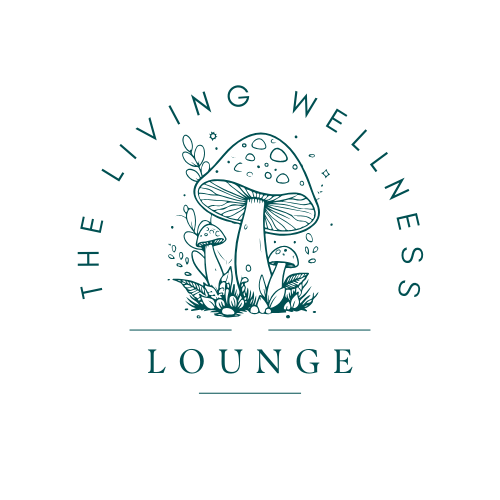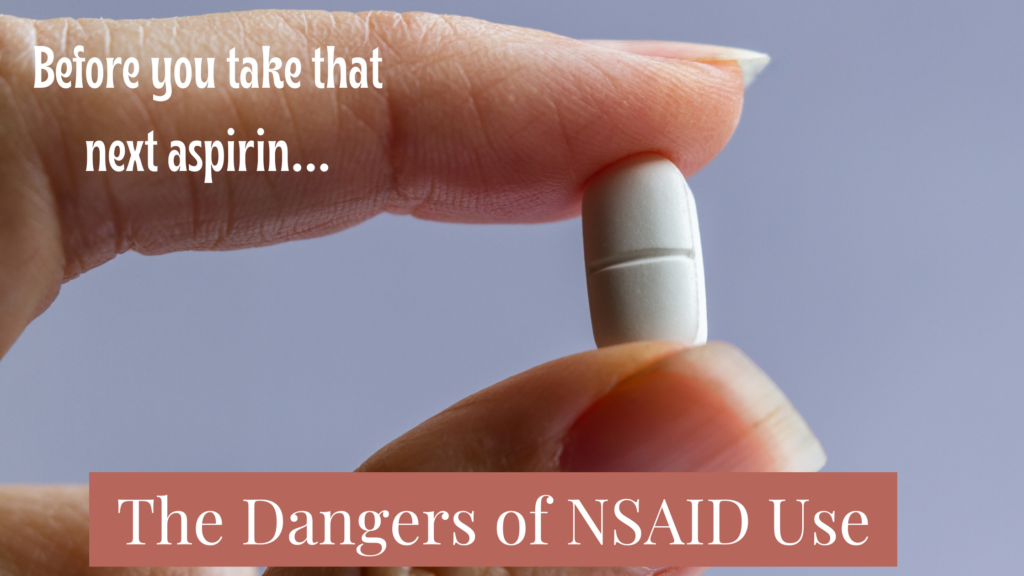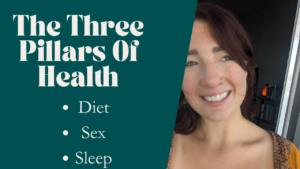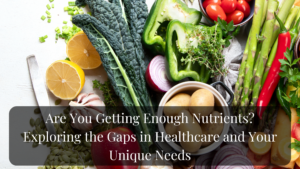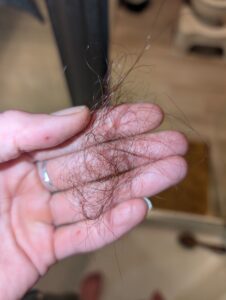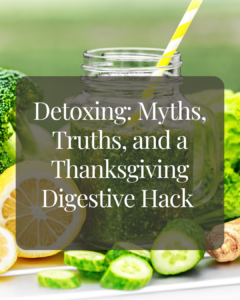Reclaim Your Health
It’s Time to Talk Pain Killers- The Danagers of NSAID Use
Many of us use painkillers regularly without a second thought anytime we have a headache, a backache, an injury, you name it. But have you ever stopped to really think about what you’re putting in your body and its effects?
Today, let’s delve into the world of NSAIDs (Nonsteroidal Anti-Inflammatory Drugs), which you may know by their common names:
Aspirin
Advil, Motrin (Ibuprofen)
Aleve (Naproxen)
When I was a teenager, I would take Ibuprofen like candy. Anytime I had a headache or backache or period cramps. I think I enjoyed something about the act. It made me feel like an adult being able to tend to my own ailments. Or maybe I liked the feeling and had a habit of self-destructive behavior. Probably both. I would carry it on me, in my purse, have it handy in my house, ask for it when I was visiting someone until one day I heard that it can cause stomach ulcers… Well, shoot, that sounds scary. I started obsessing over the thought of me having a stomach ulcer and how absolutely awful that would be. I gave up the Ibuprofen on the spot and stuck my nose up to anyone who took it from there on out. (Remember I was a teenager!)
As I grew, I learned more and more about the dangers of these substances, and I started to recognize abuse patterns of those around me when it came to painkillers. It always perplexed me, didn’t everyone know that these things had side effects? Why take the risk? It genuinely did make me curious.
I think the answer lies in people don’t really know or understand the potential harm these seemingly small little pills can do. You can buy them over the counter without a doctor involved, they’re readily available everywhere, and everyone takes them. They’re extremely normal and extremely common, so why would anyone think twice before using the product as intended?
It’s strange that health information like this feels almost fringe, the true dangers of NSAIDs are not put in front of your face and unless you’re like me a forever skeptic and questioner of everything you might never think twice about it.
Today I want to challenge you (In a loving and non-judgmental way!) to bring some awareness to this topic, what you do with that awareness is fully up to you. What I aim for is to help people stop making decisions on autopilot, and make them with eyes wide open. While information like this may feel like a burden sometimes, it truly sets you free and makes you an informed participant in your health and health outcomes. You should have a full understanding of anything that goes in your body. You can’t leave your health to someone else. Not if you want to truly find healing and Live Well.
Now Let’s Dive in!
- Nonsteroidal anti-inflammatory drugs (or NSAIDs) are the most widely used drug in the United States
- They are commonly used to treat: Pain, fever, and inflammation
- They are not curative BUT do help to alleviate pain and inflammation
These NSAIDs are unfortunately not free of side effects, some of which can be life-threatening. There are over 100,000 hospitalizations and upwards of 17,000 deaths a year from NSAID use (Gastrointestinal bleeding is one of the main causes). There are also a series of minor to more serious side effects to consider, ones that may not end in death but can put your body in a vulnerable place leading to other complications, diseases, and risks.
- Minor Side Effects of NSAIDs Include:
- Heartburn, dyspepsia, diarrhea, constipation, abdominal pain, nausea, stoats, decreased appetite, and vomiting
- Headache, insomnia, dizziness, drowsiness, tinnitus confusion, unusual weakness
- Loss of visual acuity, blurred or double vision
- Itching, rash, photosensitivity reactions, eruptions, hives
- Edema, palpitations, rapid heartbeat
- Burning or painful urination, vaginal bleeding, blood in urine, cystitis
Now that was just the minor stuff… let’s take a look at the more major effects
- Major effects of NSAIDs Include:
- Gastric and or duodenal ulceration (Ulcers), gastrointestinal bleeding
- Angina, cardiac arrhythmias, exacerbation
- Interstitial nephritis, acute renal failure, hyperkalemia (High serious potassium)
- Exfoliative dermatitis, erythema, multiform, and other unusual skin problems
- Anemia, Leukopenia
- Jaundice, Hepatitis
There are certain factors that put you at a higher risk for serious side effects like:
- Advanced age
- History of peptic ulcer disease or cardiovascular disease
- High dose use
- Long-term use
- Heavy smoking or drinking
- Kidney or liver failure
- Use of certain medication
That’s a lot of side effects, and I would wager that many people are not aware that these possibilities exist with the use of NSAIDs. And although the usage of NSAIDs has become the normal… doesn’t mean it’s not coming at a cost. Alongside this widespread use comes a declining health of a country. We aren’t getting off scot-free when it comes to drug use and it’s harming our health in more ways than we can truly grasp.
Physiologically drugs like this put an enormous stress on your liver and irritate your gastrointestinal tract. Your liver & digestion are two MAJOR systems that are crucial to your health. When we add too many insults to these systems we start to shift our body out of balance and into states of “Dis-ease.” So while it may not be as linear as we think… take a painkiller get hospitalized for something major…bu When we take these things we’re increasing our risk for heart attacks, and liver failure, kidney disease, and ulcers.
What’s the Alternative:
If you do find yourself needing to take NSAIDs there are some ways to lessen the potential side effects.
- Take With Food
- Drink a minimum of 8 glasses of water per day
- Do not recline within a half-hour of taking
- Work with your physician to see if you’re at risk for ulceration before use (*Note life-threatening ulceration is not always accompanied by symptoms)
Root Cause Resolution:
The best way to keep yourself safe when it comes to NSAID use is to minimize or stop using completely. Which may be tricky to do if you are facing chronic or regular pain and discomfort that you’ve found is alleviated with NSAIDs. If this is you the best way is to work on the source of your pain.
We look at symptoms and disease as just that a symptom, not the cause. If you can tease out and work towards resolving what’s causing your headaches, arthritis, painful period cramps, backaches, etc. at the root that you can focus on working towards that healing, eliminating the need for NSAIDs altogether.
That being said I acknowledge that can be a lengthy process and there are causes of pain that unresolvable.
If you fall into that category I would recommend still working to bring your body in balance and bringing in natural analgesics (Pain relievers) to manage your pain.
- Reduce inflammation in your body through dietary cleanup
- Ensure adequate sleep
- Ensure adequate hydration
- Find daily movement
If you need some herbal painkillers, three standout plants that come to mind are:
- Willows Bark – Salix Alba
- Turmeric- Curcuma Longa
- Corydalis- “Yan Hu Suo,” Corydalis yanhusuo
Working with herbs is generally safe and profoundly effective, if you are new to herbalism we recommend consulting with an herbalist or reputable herbal literature. Herbalism is very empowering when you take the time to understand its workings.
With Love, Lila
Works Cited
Hoffman, David. Medical Herbalism: The Science and Practice of Herbal Medicine. Healing Arts Press, 2003, pp. 412-413
